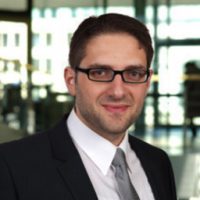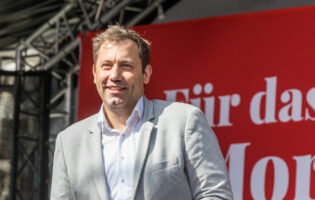AGI News
Ufuk Topkara, DAAD/AGI Research Fellow

Ufuk Topkara
Humboldt University Berlin
Dr. Ufuk Topkara is Visiting Professor of Comparative Theology in an Islamic Perspective at the Berlin Institute for Islamic Theology, Humboldt University Berlin.
Dr. Topkara was a DAAD/AICGS Research Fellow from October to December 2018. He has been active in promoting inter-religious dialogue since 2005 as an expert on Islam for the Evangelical Academy Berlin, as a member of the Jewish-Turkish Roundtables for Dialogue, and with the Catholic Academy Berlin. Dr. Topkara was a Tour Guide at the Jewish Museum of Berlin from 2005 to 2015. He was a Humanity in Action Fellow in New York and worked in the U.S. House of Representatives as a Humanity in Action-Lantos Fellow in Washington, DC. He studied History and Philosophy at Humboldt University of Berlin and Harvard University. He completed his doctoral dissertation with the Graduate School of Islamic Theology at the University of Paderborn, Germany, analyzing the convergence of reason and faith in Islam.
While at AICGS, Dr. Topkara will conduct research on a project that emerges out of the interconnected strands of intellectual inquiry: comparing the experiences of discrimination faced by Jews in early twentieth century Germany and the experiences of discrimination faced by Muslims in contemporary Germany. By drawing parallels between the marginalization faced by these two religious minority groups, Dr. Topkara will provide a tool for combating rising anti-Semitism and anti-Muslim sentiment in both Germany and the United States today.
Dr. Topkara intends to showcase patterns of marginalization and othering of religious minorities in contemporary German society. A comparison between the Jewish community of the early twentieth century in Germany and contemporary Muslim community in Germany is particularly promising because of the inherent questions of belonging. Similar to the experience of German Jews in early modern times, German Muslims nowadays struggle with locating their place within German society. In both cases, the religious minority brought up questions of belonging that goes beyond citizenship, that is, the inclusion if not appreciation of cultural and religious differences.
AGI is pleased to welcome Ufuk Topkara as a DAAD/AGI Research Fellow from October to December 2018.
He has been active in promoting inter-religious dialogue since 2005 as an expert on Islam for the Evangelical Academy Berlin, as a member of the Jewish-Turkish Roundtables for Dialogue, and with the Catholic Academy Berlin. Dr. Topkara was a Tour Guide at the Jewish Museum of Berlin from 2005 to 2015. He was a Humanity in Action Fellow in New York and worked in the U.S. House of Representatives as a Humanity in Action-Lantos Fellow in Washington, DC. He studied History and Philosophy at Humboldt University of Berlin and Harvard University. He completed his doctoral dissertation with the Graduate School of Islamic Theology at the University of Paderborn, Germany, analyzing the convergence of reason and faith in Islam.
While at AGI, Dr. Topkara will conduct research on a project that emerges out of the interconnected strands of intellectual inquiry: comparing the experiences of discrimination faced by Jews in early twentieth century Germany and the experiences of discrimination faced by Muslims in contemporary Germany. By drawing parallels between the marginalization faced by these two religious minority groups, Dr. Topkara will provide a tool for combating rising anti-Semitism and anti-Muslim sentiment in both Germany and the United States today.
Dr. Topkara intends to showcase patterns of marginalization and othering of religious minorities in contemporary German society. A comparison between the Jewish community of the early twentieth century in Germany and contemporary Muslim community in Germany is particularly promising because of the inherent questions of belonging. Similar to the experience of German Jews in early modern times, German Muslims nowadays struggle with locating their place within German society. In both cases, the religious minority brought up questions of belonging that goes beyond citizenship, that is, the inclusion if not appreciation of cultural and religious differences.









